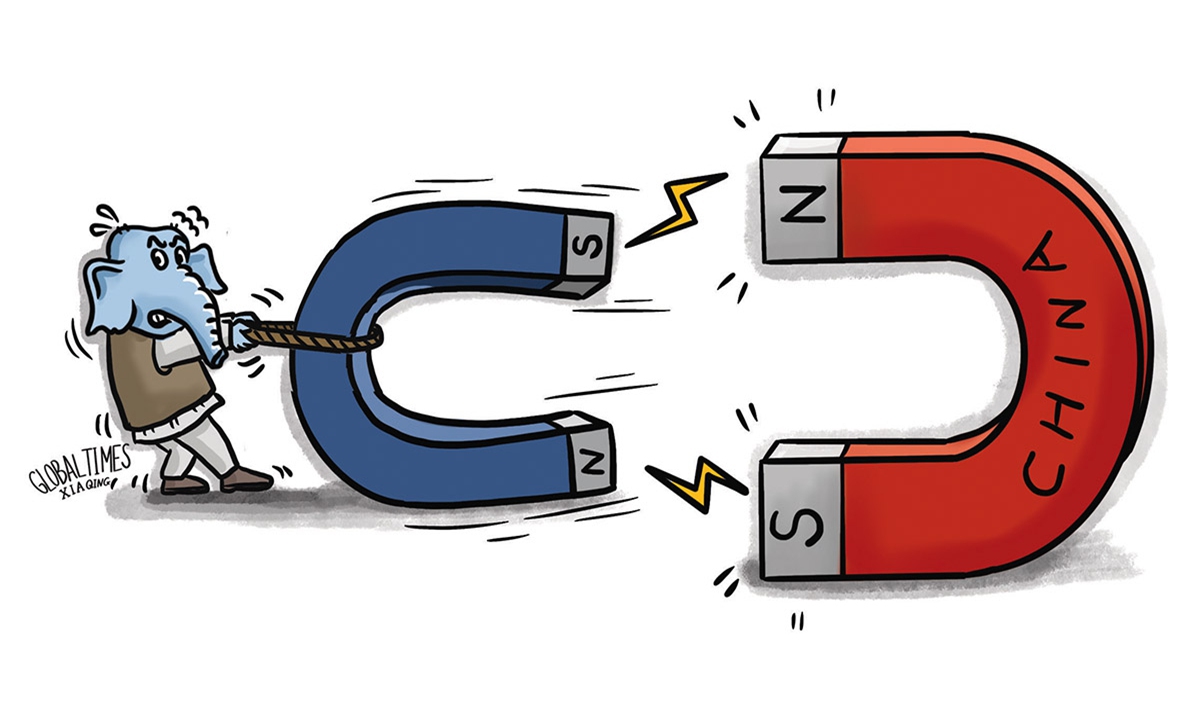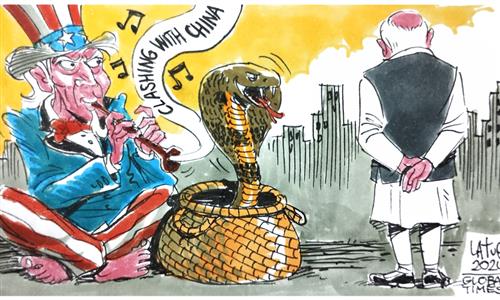China, India hold 'candid, in-depth' talks on boundary issues but Jaishankar says 'won't compromise'

India Illustration: Xia Qing/Global Times
As China and India agreed to continue talks through diplomatic and military channels to resolve border issues at the latest border consultation in Beijing, India's External Affairs Minister S Jaishankar said he will "never compromise on securing borders," a move analysts viewed as a trick to pass the buck to China over the dispute and try to gain more leverage to bargain with Beijing.
According to a release from the Chinese Foreign Ministry on Thursday, China and India held the 29th meeting of the Working Mechanism for Consultation and Coordination on India-China Border Affairs (WMCC) on Wednesday in Beijing.
The two sides made positive comments on the progress made in bringing the border situation under control, had a "candid and in-depth" exchange of views on the next stage of work, agreeing to reach a mutually acceptable plan at an early date and push the border situation into a phase of regular control.
They agreed to continue to maintain communication through diplomatic and military channels, improve the negotiation and consultation mechanism, and agreed to strictly abide by the existing agreements and protocols, continue to consolidate the achievements of the previous efforts, and maintain peace and tranquility in the border areas.
Also on Wednesday, during his meeting with the Indian community in Malaysia, Jaishankar said, "My first duty to Indians is to secure the border. I can never compromise on that," according to India's NDTV.
Jaishankar claimed that "normalcy in bilateral ties with China will only be achieved based on the traditional deployment of troops and will be the prerequisite for the relationship with Beijing in the future."
Hu Zhiyong, a research fellow at the Institute of International Relations at the Shanghai Academy of Social Sciences, told the Global Times on Thursday that Jaishankar's "tough words" were made with an eye on the upcoming election.
More importantly, the words and acts from the Indian diplomat were also likely aimed at passing the buck to China over the border standoff and worsening bilateral ties, Hu said, noting that China needs to be wary of India's tricks to "internationalize the border disputes."
False remarks over the Chinese territory of Zangnan by Indian politicians, including Prime Minister Narendra Modi, were slammed by the Chinese Foreign Ministry as "absurd." Senior Colonel Wu Qian from China's Ministry of Defense on Thursday stressed that "It is an undeniable fact that Zangnan has been Chinese territory since ancient times, and there's no so-called Arunachal Pradesh."
Jaishankar expressed support for Manila over its South China Sea disputes with China during his recent meeting with his Philippine counterpart.
It's India that keeps provoking China and making trouble on the border issue in order to gain more leverage to bargain with China, Hu said.
"There is more about China-India bilateral relations than the border issue," Hu said, "But Indian politicians have tried to use the border issue to kidnap the bilateral relationship."
Earlier this month, data from the China General Administration of Customs showed that China's trade with India in the first two months of 2024 surged by 15.8 percent year-on-year, making it one of the fastest growth rates among China's trading partners.
Analysts believe that the current border situation is still generally under control, adding that China and India should further manage their differences in a practical manner and prevent a small case developing into a major one or even a military conflict.
"Both the Indian government and media should be careful in their words and actions, and respect basic historical facts on the territorial issue. Only in this way can China-India relations move forward in a healthy way and return to the normal track," Hu said.
China, which always seeks cooperation, does not want to make India an enemy, and India should not treat China as a "threat" and rival, said Hu.


